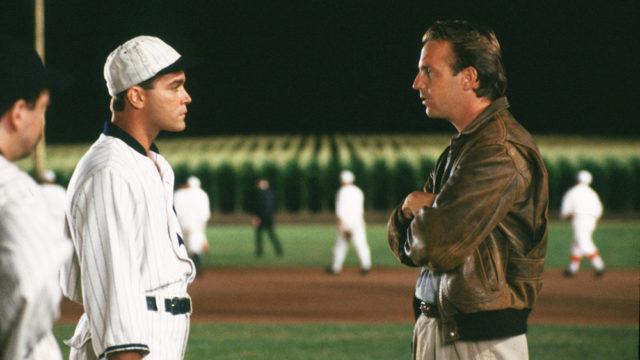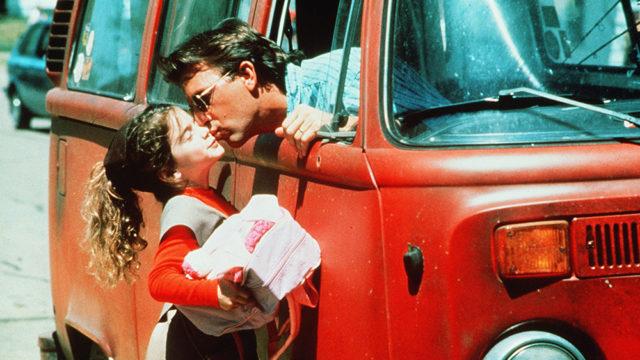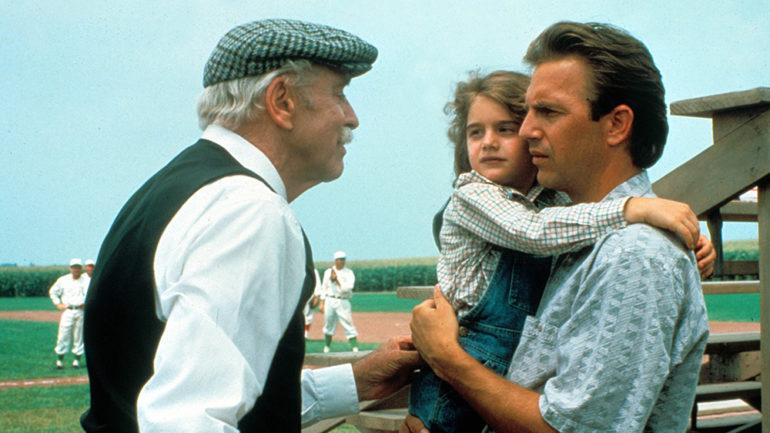‘Field of Dreams’ Turns 30: Why the Baseball Classic Still Holds a Special Place in America’s Hearts
By Susan King LOS ANGELES (Variety.com)
And the mysterious voice in the adored 1989 fantasy film “” does not tell Kevin Costner: “If you build it, they will come.”
Released 30 years ago on April 21, 1989, “Field of Dreams” stars and Amy Madigan as Ray and Annie Kinsella, a couple raising corn on a bucolic Iowa farm with a young daughter, played by Gaby Hoffman, who went on to star in “Transparent.”
At dusk one evening, Ray hears a voice saying “If you build it, he will come.”
But according to the film’s writer/director Phil Alden Robinson, there is a whole group of people who insist it’s “they.”
“It’s called the Mandela effect — people who swear they’ve seen something that really didn’t happen,” noted Robinson.
Or in this case, they heard something that wasn’t said.
“There was some website devoted to people saying, ‘I know for a fact when the move came it, it said, ‘if you build it, they will come’ and Universal changed it.”


However, Robinson and the studio have been tight-lipped over the past three decades about who actually says those lines in the movie. “In the credits, it says ‘Himself,’” said Robinson. “I thought that was sort of funny. It was okay with the person who did the voice, so we just decided to keep it a secret.”
“It” is a baseball diamond. And eventually, Shoeless Joe Jackson (Ray Liotta), a member of the infamous 1919 Black Sox baseball team, comes out to the cornfield with other members of the team and begins to play baseball there. But the real reason for baseball diamond is for Ray to connect with the young version of his late father John (Dwier Brown) who also comes out of the field. The two play catch during the finale, a moment tends to turn grown men’s hearts into mush.
Based on W.R. Kinsella’s book “Shoeless Joe,” the film also stars Timothy Busfield as Mark, Annie’s brother who doesn’t see the players and wants them to sell the farm; James Earl Jones, as Terrence Mann, a J.R. Salinger-esque writer and Frank Whaley/Burt Lancaster as Moonlight Graham.
Nominated for three Oscars — best film, adapted screenplay and for James Horner’s score –“Field of Dreams” had a worldwide gross of $84 million. The film made Costner, who gives one of his strongest performances, an even a bigger star — and he became heartthrob at the time.
But “Field of Dreams” is more than just a baseball movie. It’s about fathers and sons; fathers and daughters. Love. Loss. And memories.
“For whatever reason, it entered the culture,” said Robinson.
Several people involved in the film and its legacy recently talked about the movie three decades later.
 Field Of Dreams – 1989
Field Of Dreams – 1989Pilgrimages to Dyersville, Iowa
According to Roman Weinberg, the operations manager of Go the Distance Baseball, the company that brought the Lansing farm where the film was shot in 2012, some 115,000 people flock to the movie site every year.
“We do have a good segment of those who are returners,” said Weinberg, who has seen the film at least 24 times. “But a majority surprisingly are newcomers and have wanted to come for years. We get thousands of new faces. We get people from Australia, China and Japan.”
Though the main premise of the movie is baseball, he noted, “the moral of the story is following your dreams no matter what and being able to right a wrong. I can’t tell you how many grown men I have come across that have cried when coming here and tell me that they weep every time they see the last scene of the film. “
There are home tours 359 days a year and recently fans can spend the night at the house — that is if you want to spend $900 for a weekend or $750 on a weekday for prime season.
Weinberg said that fans began to show up at the farm within weeks of its release. And when people started coming to the farm, a group of local extras who appear in the film — two of them even have speaking parts — ordered 1919 Black Sox Jerseys and came out of the corn and started interacting with the fans.
And the Ghost Players still come out on Sundays and performer a 90-minute Harlem Globetrotters comedy routine getting the audience involved. “We usually get 500-700 people every Sunday,” said Weinberg.
The farm is expecting at least 3,000 fans to show up for the film’s 30th anniversary party on June 15.
“We’re going to show the movie and also having a game under the lights between the Ghost Players and what we are calling the Iowa Dream Team made up of celebrities with Iowa roots. We’re going to have Dwier Brown on the team.”
View this post on Instagram
A post shared by Kevin Costner Fan Germany (@kevincostner_fan_germany) on
Casting Burt Lancaster
Robinson initially wanted James Stewart to play “Doc” Graham, aka “Moonlight” Graham, a professional baseball player who only appeared in one major league game for the New York Giants in 1905 and later became the doctor. Robinson was looking for a veteran star for the role of the elderly Graham “because the real ‘Doc’ Graham was the star of is town.”
Stewart turned it down because his agent told Robinson he didn’t want to play a character who died. “I said, ‘Oh, Gosh, I wish I’d been able to talk to him because I would’ve told him he doesn’t die. Sort of. So, my next choice was Burt because Burt was an enormous movie star and also had been an athlete in his youth. I thought that was important to believe this guy could’ve had a shot at the big leagues.”
The Oscar-winning actor did have a reputation for being difficult. And Robinson acknowledged “He was a tough guy. He comes from a different school of working out gestures. He always wanted to stop and turn back to the camera. He had his old…I don’t want to say tricks, but he had his old techniques he would like to use.”
“Field of Dreams” ended up being Lancaster’s final film. Though just 74, “he was in failing health,” said Robinson “He was on a set full of young people who were healthy and strapping and throwing baseballs around. I think that really made him feel old and not the jock he had once been.”
Still, Lancaster’s performance is transcendent. And he made friends with Busfield.
“Man, did he have it!” Busfield said of his performance, recalling his experience with the actor, who died in 1994.
“Instead of sitting in his trailer making phone calls,” said Busfield, “he goes and gets in his wool suit in 100-degree heat and comes and sits in a chair on the set. I went over and talked to him and he said, ‘I played the bad guy on “Vera Cruz.” Stole the picture. Stole it.‘ He would tell me stories.”
Lancaster, he added, “would tease. He was fun. He was sweet. Those golden age guys — they show up, sit in the chair all day. They do their job and they go home.”
Batter up
Robinson has warm memories of Rod Dedeaux, who was USC’s baseball coach for 45 years, and whipped the cast with the coach Don Buford into baseball history.
“I needed to have somebody who could train all of our baseball players because they needed to look like they could really play,” recalled Robinson. “We had a boot camp here in L.A. for the actors who were cast. And they were in Iowa working with our players and the extras.”
One day, Robinson asked Dedeaux, who has a baseball field at USC named after him, why he didn’t play in the majors.
“He got very quiet and said, ‘Well I did. I played for the Brooklyn Dodgers. I was the starting shortstop and I played one game. I broke my back.” I said ‘God, you are Moonlight Graham.’ And he just nodded. It’s the only time I saw him quiet all summer.”
View this post on Instagram
A post shared by Kevin Costner Fan Germany (@kevincostner_fan_germany) on
Fields of Drought
There was a massive drought the summer of 1988 during production. “Nobody had corn that summer,” said Robinson. “The schedule was really built around where we thought the corn would be. Because had a certain date to start shooting and ending the shooting on, we scheduled it for last. We shot all of the interior scenes.”
And there still was no rain.
Fortunately, the Lansing farm had a little creek. “We damned up the creek and we trucked in water. We just irrigated the fields like crazy,
It might have been a little too crazy.
“It grew so fast that in the second scene when Kevin is walking through the corn and he hears the voice, we had to build him up on apple boxes,” Robinson remembered.
Horner hits the right notes
It’s no secret that ’s Oscar-nominated haunting score — especially in the pivotal last five minutes of “Field of Dreams” — is one of the reasons the movie is such an emotional experience that seems to especially resonate with men.
“Horner’s score makes a huge contribution to the narrative (and that’s why it’s his third of 10 Academy Award nominations),” said film music historian and Variety contributor Jon Burlingame. “The score is mostly synthesizer-based, and Horner’s delicate piano and tasteful electronic sounds provide an appropriately, and effectively, ‘magical’ feel to the mysterious associated with Kevin Costner’s baseball field and the ghosts of the 1919 Black Sox scandal. Yet near the end, Horner brings in a full orchestra to help realize the film’s full emotional potential.”
Busfield described the score as climbing a “ladder musically and hits a note that I swear to God is like a dog whistle for men’s emotions. Right when [Ray] says, ‘You want to have a catch?,’ the music crescendos up and releases a veil, I think. Men are moved in ways that they’re not normally moved. I was absolutely moved by that.”
Robinson had originally wanted Leonard Bernstein, who had earned an Oscar nomination for his only film score for 1954’s “On the Waterfront,” to compose the music.
“We actually made an offer to Bernstein and his agent just laughed at us and said, ‘Lenny’s booked for the next five years.’ So, I thought, ‘Well, who else?’”
He always admired that Horner “found interesting ways of conveying feelings. When I showed it to James, and he cried when he saw the film. It was the first time we had shown the film to someone who hadn’t been part of it.”
The filmmaker found it thrilling to work with the late composer. “I think the first three quarters of the movie was written in the studio,” said Robinson. “He called it painting where he had written themes and then went into a small studio with just a keyboard and a couple of synthesizers and a couple of flute players and percussion players. He just constructed it layer by layer in the studio. The ending was a fully scored orchestra session.”
Actor-turned-author
Dwier Brown, who played Ray Kinsella’s late father John, admitted that for 25 years that he was “embarrassed that people would make such a fuss over me, over ‘Field of Dreams,’ just because I had such a small part.”
He waited all of those year for Costner or Jones to write a book about the experience. When that didn’t happen, Brown decided to put pen to paper and wrote “If You Build it….’ He travels around the country making appearances at various baseball fields around the country.
“Like Ray Kinsella in the movie, I kind of had a rough patch when I was a teenager with my dad,” said Brown, adding that his own father died right before he began the film. “In a funny way, I look at this as my little penance. I’d go and talk to other people about their dads and tell them about mine. It’s kind of a great way to keep my dad’s memory alive with me. I’m taking the mitt that he used to wear and that I used to wear as a little kid. There’s something very beautiful about that. It’s just an actor and a stranger talking, but it’s really kind of amazing how deeply you can connect because those memories stay with you much longer.”
Magic time
That final scene between Costner and Brown was shot over several days at dusk — known as magic hour in the film business — because cinematographer John Lindley and Robinson noticed how extraordinary the light was at that time in the Iowa countryside.
“At the end of the day, we’d knock off a setup or two setups from a dusk scene,” said Lindley. “Phil turned a bunch of stuff into dusk. I think that had a big effect.”
And there were no special effects in the film. “Phil and I had met with visual effects companies — very high-end companies with very accomplished people who pitched ideas to him about how the players would appear — there could be a flash of light or they could sort of come out sparkly. Phil was the one who repeatedly said, ‘No I don’t want any of that stuff.” In the end, they just dissolve into the field. It could not be simpler than that.”
Clean Shaven Center Fielder
Writer Jeff Silverman was an entertainment editor at the Los Angeles Herald Examiner when his good friend Robinson asked him to be one of the ghost players in “Field of Dreams.”
The two were friends and Silverman had read the script as Robinson was writing. “The script was fabulous.”
Silverman had to cut his shoulder length hair and long beard for his role as the ghost player who catches young Moonlight Graham’s fly ball.
Getting the ball to him was difficult, especially because they wanted him to remain in focus. Eventually, they brought out a machine that would spew out balls. However, the balls initially went into the field and over his hands, so they lowered the machine.
“That put me in the cross hairs of the [machine],” he noted. “I am wearing this old uniform that had been used in ‘Eight Men Out,’ and I’m wearing the shoes Rob Lowe had worn in some soccer movie, which were about four sizes too big for me. The glove is an ancient glove. There’s no padding. There’s no webbing.”
Silverman realized the ball was “screaming” right at him. So, he had to make a quick decision — does he duck or put his hand up to catch the ball and possibly break his hand.
He broke his hand. To make matters even more painful, “they had to keep shooting it again and again on other close-ups and other angles. My hand underneath got redder and redder and blacker and blacker. I had to go to a doctor.”
Silverman had a blast the week he was there playing baseball, having dinner several times with James Earl Jones and hanging out with the rest of the cast. And he still sees the film about six or seven times a year because he knows that will help with his residual check. “I made a minor fortune from this movie,” Silverman said, laughing.
What’s in a name?
The original name of “Field of Dreams” was actually “Shoeless Joe,” the name of the book it was based on. That is, until Robinson got a call from Universal chief Tom Pollock that the title wasn’t testing well. “The potential audience members thought that the movie was about a homeless guy or they think Kevin is a homeless guy,” noted Robinson.
Universal tested other titles and decided on “Field of Dreams.”
“I said, oh my god, it sounds like a room deodorizer,”’ he recalled Robinson “I hated the title.”
He begged Pollock to test it one more time as “Field of Dreams” hoping the scores would go down. But in fact, they went up. So, he had to let Kinsella know about the name change.
Ironically, losing “Shoeless Joe” didn’t upset Kinsella. “That wasn’t even my title,” Kinsella told Robinson. “That was the publisher’s title.” “What was your title?,” Robinson asked. He said, “Dream Field!”
A special anniversary screening is planned nationwide through Fathom Events on June 16 and 18.
